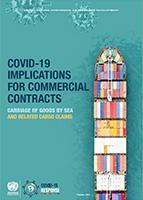
The smooth flow of international trade depends entirely on the transport chain: adequate and timely supplies to manufacturers and efficient capillary distribution chains are essential ingredients of any successful business model.
The recent and ongoing Coronavirus outbreak, together with the measures many countries are adopting to bring the pandemic under control, are creating significant impediments to transport systems and supply chains which are facing unprecedented challenges on a global scale.
This challenge hits the global trading system at a juncture in which efficiency is imperative and movement of goods and provision of services on a “just-in-time” basis are the cornerstones of success for public and private service providers alike.
While the pandemic and related measures are clearly temporary in nature, the effects on international trade are potentially important, with longer-term repercussions.
Paperless transactions are already possible but not yet fully accepted in large sections of the transport industry while automation and robotics in port services are not yet playing a sufficient role to secure the network from interruption.
It is likely that the pandemic will boost the development of technology and increase its use in the very short term, and collaboration, coordination, and cooperation among public and private stakeholders at all levels is improving, but for the time being significant related challenges remain.
The purpose of this briefing note is to illustrate some of the implications of the Coronavirus pandemic for commercial contracts on carriage of goods by sea and related cargo claims, and to identify a number of common legal and commercial issues arising from it.
Some approaches to addressing these issues will also be suggested with the purpose of encouraging discussion between the affected parties and stimulating preventive measures for future deals.


